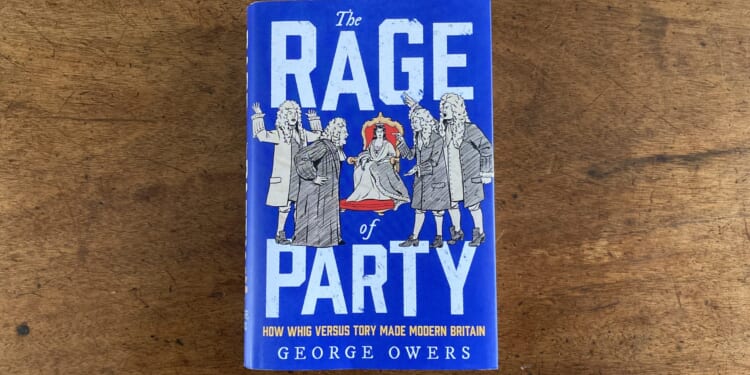The Rage of Party: How Whig versus Tory made modern Britain by George Owers
In his acknowledgements, George Owers writes that he “fell in love” with the period covered in this book, 1678 to 1714,
“partly as a result of reading Michael Foot’s brilliant account of Jonathan Swift’s role in the battle over the peace of Utrecht, The Pen and the Sword. I do not suppose for a second that this book is as good as Foot’s, but I do have in common with Foot the fact that I am not a professional historian, or indeed in my case a professional writer.”
Love of the past is the best reason to become an historian. I have not read Foot’s book, but mention of it impels me to pass on the reply he gave when asked what one should read about John Wilkes.
Foot with great enthusiasm recommended The Early History of Charles James Fox, by Sir George Otto Trevelyan, which is indeed a marvellously entertaining work, impelled by a deep love of the subject.
Owers thanks the “brilliant and extraordinary” academic historians without whom his book “would be impossible”, but says he was “keen to enjoy a certain freedom from the shackles of the academic style and approach”.
This he has done: he has liberated himself from the academic style, and in doing so he liberates his readers. We enjoy with him the ferocity of the early battles between the Whig and Tory parties, “as vitriolic…as any social media spat in the 21st century”.
The conflict “between Tory nationalism and Whig cosmopolitanism”, the question of whether England (from 1707 Great Britain) should be involved in European affairs or cut itself off from them, finds echoes three centuries later in Brexit, each side incredulous that the other can disagree with self-evident truths.
The book opens with the arrival in London in 1709 of “thousands of exhausted, traumatised refugees” from the Palatinate, in Germany, their lives wrecked by years of European war.
The Whigs, who are in power, greet these Palatines as “plucky Protestant heroes”, and believe that like the Huguenots – the Protestants driven out of France in 1685, many of whom were silk weavers or bankers – these new arrivals will benefit the economy.
So the Whigs in early 1709 passed the Foreign Protestants Naturalisation Act. But England itself was under strain, bread prices had rocketed because of a poor harvest, and the Tories warned that “poor industrious” English families would be ruined by foreign competition for jobs.
Thomas Hearne, an ultra-Tory Oxford scholar, described in his diary a “commotion” near Harrow on the Hill:
“3 or four honest Englishmen being got together, and being drinking a Pot or two of Ale, they happened to see the said Palatines go by, and of course they made some Reflections upon the Receiving of these People into the Kingdom; which being heard by one of the Palatines, he gave a hint to his Companions, & they all immediately came into the Room, beat the persons in a very rude and inhumane manner, and were about to have cut their Throats, but the Constable being call’d in and a number rais’d they were over-power’d in their Attempt; but instead of receiving condign Punishment when they were had before a Justice of Peace they were dismiss’d with a soft Reprimand, & the answer given for this Easy Penaltie was that being Forreigners they were ignorant of our English Laws, & ‘twould be a piece of Barbarity to make them subject to it as yet.”
How easy it is to assert that English judges never used to err on the side of leniency towards foreigners. This striking quotation is found on page three of the book, which is a bit over 500 pages long.
The author no doubt had to exclude much remarkable material, but one of the strengths of the volume is that it is not short, and we are not fobbed off with mere paraphrases, but are given the often inglorious details.
We learn something of the life and character of Titus Oates, William III, Thomas Wharton, Henry St John (later Viscount Bolingbroke), Edward Harley (later Earl of Oxford), Queen Anne and many others.
And we learn something of human nature. In the struggle for power, which soon becomes a struggle for survival, the temptation to strike low blows is liable to become overwhelming.
The Whigs were at length victorious in the party battle, but as Owers observes, the long dominance of Robert Walpole (Prime Minister 1721-42) sprang partly from his caution.
He avoided foreign wars, with their heavy expenses and imponderable risks, and this was exactly what his Tory opponents wanted.
Walpole restored calm after the debacle of the South Sea Bubble. Owers describes the creation in 1694 of the Bank of England: “fundamentally, a sustainable way of tapping the great wealth of Britain for the purposes of the state had been found.”
Because of the Bank, Britain could afford to fight wars, and acquire an empire. Dutch finance, introduced under the Dutch King William III, laid the foundation of worldwide power.
It is impossible, while reading an account of this kind, to avoid wondering what effect the decline of Christianity has had on our politics.
The Tories stood for the Church of England. The Whigs, while favourable to Dissenters, were anti-Catholic.
These arguments matter far less than they did, but our politicians have developed other ways of claiming the moral high ground. Flimsy structures, moralities with no foundation, are erected, and endorsed by those who wish to persuade themselves of their own superiority.
Perhaps Owers, without particularly intending to do so, has struck a blow against such wishful thinking.
His book is part of a wider recovery of tradition. The pretence that we could derive sustenance from the dried up pabulum of secular propagandists has proved unsustainable.
The alternative to that pretence is not a perfect world. Many of the characters in this book are well-known fornicators and sinners.
And that is part of the realism of Christianity: it is for sinners. But I have strayed beyond the book under review, which offers a magnificent account of England three centuries ago.









![Florida Officer Shot Twice in the Face During Service Call; Suspect Killed [WATCH]](https://www.right2024.com/wp-content/uploads/2025/12/Inmate-Escapes-Atlanta-Hospital-After-Suicide-Attempt-Steals-SUV-Handgun-350x250.jpg)

![Keith Ellison Caught Promising to Fight State Agencies for Somali Fraudsters [WATCH]](https://www.right2024.com/wp-content/uploads/2026/01/Keith-Ellison-Caught-Promising-to-Fight-State-Agencies-for-Somali-350x250.jpg)





